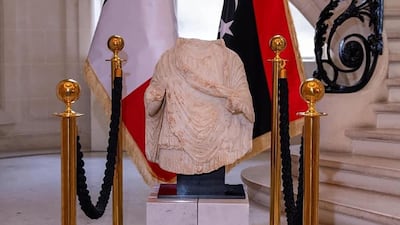A sculpture from the 4th century BC has been returned to Libya from the Louvre in Paris after it was stolen during the 2011 Arab uprisings.
The funeral statue, which commemorated an unknown man at his grave, had been smuggled illegally from the city of Shahhat, in the north-east of Libya, and housed in the world-famous museum in the French capital since 2016.
The headless bust dates to when that area of modern Libya was part of the Ptolemaic kingdom, an ancient Greek state founded by a one of Alexander the Great’s generals who ruled Egypt, according to the Libyan National Museum.
The 56cm statue arrived at Mitiga Airport in Tripoli where it was handed over by Abdullah Gaderbou, the head of the Administrative Control Authority, to Ali Shalak, chief of the Antiquities Department.
It was agreed in October that the bust would be returned and it was picked up by Mr Gaderbou during an official visit to Paris last week and packed in a special wooden crate to be taken back to Libya.
“We thank everyone who contributed to the return of this piece to its homeland, affirming our commitment to protecting and restoring our cultural heritage,” said the National Museum in a statement on its Facebook page.
Libya has a rich archaeological heritage but the country has faced looting of some of its ancient artefacts.
The modern city of Shahhat, in the Cyrenaica region, sits on the site of the ancient city of Cyrene, which was founded in the seventh century BC. The area was added to the Unesco World Heritage List in 1982.

American prosecutors and law enforcement officers announced in 2022 the return to Libya of another marble statue, called Veiled Head of a Female, which had been smuggled from the area.
A long investigation concluded that in 2000 New York billionaire Michael H Steinhardt bought the antiquity, worth $1.2 million, which came from a tomb in Cyrene.
While the civil war that followed the toppling of former Libyan dictator Muammar Qaddafi led to an increase in the looting of artefacts, disputes about ancient treasures date back to when Europeans first came into contact with the region.
Libya and the Crown Estate in the UK are locked in a dispute over the Leptis Magna ruins, Roman artefacts the Libyans claim were looted by the British in the 19th century.
The UK says it “understands” they were gifts from the ruler of the ancient coastal region of Tripolitania, moto the Prince Regent in 1817 and has so far resisted all calls to hand them back.
At the end of last year, Storm Daniel struck the area, destroying two major dams and releasing large amounts of water into the already inundated region.
As well as killing 4,300 people and displacing 40,000, the flooding also damaged archaeological sites in Libya.
Age-old argument
The issue of whether to return ancient artefacts held in museums in Europe and the US has been the subject of intense argument.
A 2,000-year-old funerary statue of the Greek goddess Persephone, also stolen from Cyrene in 2011 and taken to the UK, was returned to Libya in 2021.
But calls to return the ancient bust of Queen Nefertiti to Egypt are being resisted by Berlin's Neues Museum.
Meanwhile, the decades-old diplomatic row between the UK and Greece over the Elgin Marbles continues to simmer and occasionally boil over.
British Prime Minister Rishi Sunak was due to meet Greek Prime Minister Kyriakos Mitsotakis to discuss the Parthenon sculptures at the end of last year.
But he cancelled the meeting a day after Mr Mitsotakis said having some of the marbles in London and the rest in Athens was "like cutting the Mona Lisa in half" and reaffirmed calls for the sculptures to be returned to the Greek capital.


